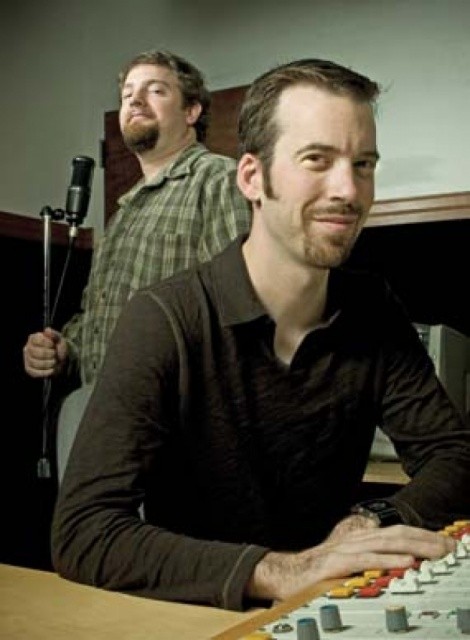
“It’s real underground radio,” jokes Troy Mumm, one of the forces behind Utah Free Media, a planned Internet-only radio station that has gone from concept to flipping the switch in a few months.
Some volunteers manning the brooms come from the ranks of volunteers at KRCL 90.9 who have—or soon will—lose their on-air DJ spots to a format change scheduled to take place May 5 at the community radio station. Others, like Mumm, one-time KRCL music director, staffed KRCL in an earlier era.
Their big idea is a big experiment. Scads of radio stations now stream on the Internet. But instead of music-on-demand streaming, Utah Free Media will attempt a live broadcast hosted by volunteers. That is, freeform radio, like KRCL. Or, as some Utah Free Media volunteers say, like KRCL before the eminent format switch.
The Internet brings the added benefit that after each Utah Free Media show is broadcast live, it will be archived for podcast. In theory at least, Utah Free Media listeners will be able to program their iPods to download their favorite shows. That’s, “assuming I finish the codes,” says Mike Place, Utah Free Media’s computer guy.
Small Internet radio stations sprang up like weeds in the early 1990s, only to be largely wiped out thanks to rising costs of licensing music. Utah Free Media volunteers say they will succeed because they don’t need much in the way of money or listeners.
“We’re doing it more for the love of radio, and community and music,” says Mumm. “Our purpose is to have a continuation of grass-roots, volunteer-based radio.”
The primary cost of Internet radio is bandwidth. Utah Free Media’s bandwidth is being donated by Salt Lake City Internet service provider Xmission. Activists were pleasantly surprised to find music licensing agreements will cost the station just $1,000 per year, though that price will grow if the station becomes popular. Studio equipment comes courtesy of donations from a radio station and a local audio equipment store.
The idea for Utah Free Media came out of meetings held by KRCL management to explain the station’s move away from its longtime volunteer programmed format. KRCL managers hope three new paid staff members and a consistent sound will keep people listening longer. The new daytime DJs are old hands: Ebay Jamil Hamilton, host of Rhythm Kitchen, David Perschon, host of Friday and Saturday Breakfast Jam, and “Bad” Brad Wheeler, host of Roots & Blues.
“I think people are going to be very pleased with the sound, because these people know their music,” says KRCL manager Donna Land Maldonado.
Other changes at KRCL include moving news to the evening hours. Programs catering to minority communities will switch to the 5 a.m. slot, then be available for Podcast from KRCL’s Website for anyone who can’t tune in at an early hour.
That last move—moving ethnic programming to the mornings—is cited by some Utah Free Media activists as a reason they want something else.
“I like the fact that I can tune in and get my Chinese lesson at 7 p.m.,” said Terra Cronshey, a Utah Free Media’s board member. Such programs might not earn big audience share ratings but are important to particular communities, she says.
“What they aren’t doing is what we are going to pick up, the community aspect,” Cronshey says. KRCL directors object to the idea they are shirking community, pointing to hours of public-service-announcement broadcast.
Utah Free Media’s plans include live local concerts broadcast from coffee houses or bars. Mike Place, an Xmission employee by day, says such live broadcasts are easier for the Internet than traditional radio, requiring only his $500 laptop. Utah Free Media also hopes to link up with likeminded community groups to host information on group activities or podcasts of local arts events. That radio-plus aspect is one reason the organization changed its name to Utah Free Media from the original Radio Free Utah. The other reason is that KRCL’s lawyer sent the upstart Internet radio organizers a cease-and-desist letter saying “Radio Free Utah” was the property of KRCL.
A new study of Internet radio from Arbetron, the company that surveys radio listeners, shows 13 percent of Americans are now regular internet radio listeners. Revenues from Internet radio remain a blip, but a flood of companies are lining up to make the device that will become the iPod of Internet radio.
“It’s the future,” says Babs De Lay, who is donating space in the basement of the Dakota Lofts from where she will continue to broadcast her long-running Women the Third Decade program. “The community always wanted to be on the cutting edge,” she says.
Pete Tridish, a founder of Philadelphia-based Prometheus Radio Project, which helps community activists set up low-power FM signals, says he’s has seen Internet-only community radio tried with varying success depending on Internet access and computer savvy of the population. While inexpensive to start, costs can mount with large listener numbers as stations must pay each time a user taps into the signal. But in the current environment, with low-power FM licenses virtually impossible to come by, Prometheus typically recommends groups start with an Internet stream.
For now, volunteers with Utah Free Media have the enthusiasm of cast members in a Judy Garland-Mickey Rooney-“Let’s put on a show!” musical. Utah Free Media hopes to be on the air—probably with something canned—in time for a launch party April 18, and with live, hosted programming by the end of the month.
“Terrestrial broadcasting is in trouble and they don’t know how deal with it,” says Place. “Just putting a stream online that’s identical to your terrestrial broadcast isn’t enough. We will put as much content online as we can get a hold of. And we’re not limited to 24 hours a day.”
Place notes broadband access is now available in UTA TRAX trains. “The last frontier is the ride home in the car, and that is going away,” he says.
Adds Mumm, “Who listens to an FM transistor on their headphones?”